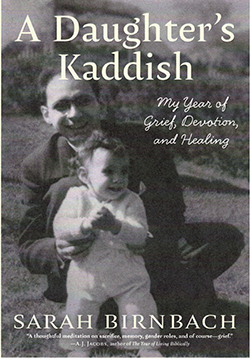A Daughter’s Kaddish: My Year of Grief, Devotion and Healing by Sarah Birnbach; Los Angeles: Wonderwell Press © 2022; ISBN 9781637-560228; 285 pages including acknowledgements, glossary, and endnotes; $26.99.

 SAN DIEGO – From the time she was a child, author Sarah Birnbach always went to her father Marvin for comfort. Her strained relationship with her mother permitted no such interaction. When her father died, in some ways she felt like an orphan, even though her mother was still living. There was no recognition on her mother’s part that Sarah was grieving too. What would she know about loss, her mother would say, she wasn’t married for 54 years.
SAN DIEGO – From the time she was a child, author Sarah Birnbach always went to her father Marvin for comfort. Her strained relationship with her mother permitted no such interaction. When her father died, in some ways she felt like an orphan, even though her mother was still living. There was no recognition on her mother’s part that Sarah was grieving too. What would she know about loss, her mother would say, she wasn’t married for 54 years.
In fact, Sarah was a divorcee and an empty nester mother of two children. Her way of honoring her father, and to allay both her grief and loneliness in his absence, was to commit to say Kaddish for him twice a day (at shacharit and mincha-mariv services) at her Conservative synagogue near Washington D.C.
That usually worked out well when Sarah was at home, but often as a consultant she had to travel to different parts of the country. Before she left on a trip, she would call synagogues, temples, and Chabad houses in or around the city she was visiting to learn if they held daily morning and evening services. If they didn’t, she might travel to another nearby city and commute to where she was consulting, just so she could be assured of having a minyan to attend morning and night.
As a woman, she was not always welcome. At one Chabad congregation she was told dismissively that women don’t say kaddish. At others, she would be the only woman, sent to a balcony or a separate room to pray as the men held their service within earshot.
On other occasions, Hillel, Reform, and Conservative groups—especially in small towns – would cast wide nets to raise a minyan so that the requisite ten people would be there to form for Sarah the required community for prayer. How grateful she was to them! Sometimes, non-Jews would fill her minyan, and while this is not kosher in the view of most Jewish religious authorities, Sarah figured that God would appreciate her kavanah (praying with intention.)
There were a few occasions when despite Herculean efforts, a minyan could not be raised, leaving Sarah feeling empty and frustrated. She would privately repeat the Kaddish prayer, again not kosher according to most movements, but it was an expression of her intense love and commitment to her late father.
When her 11-month mourning period ended, Sarah had become so conversant with the daily Jewish prayer service that she was able to lead the minyan. Remembering how much she appreciated other people helping her to say Kaddish, she returned to her synagogue to attend the minyan, not every day but often.
*
Donald H. Harrison is editor emeritus of San Diego Jewish World. He may be contacted via donald.harrison@sdjewishworld.com